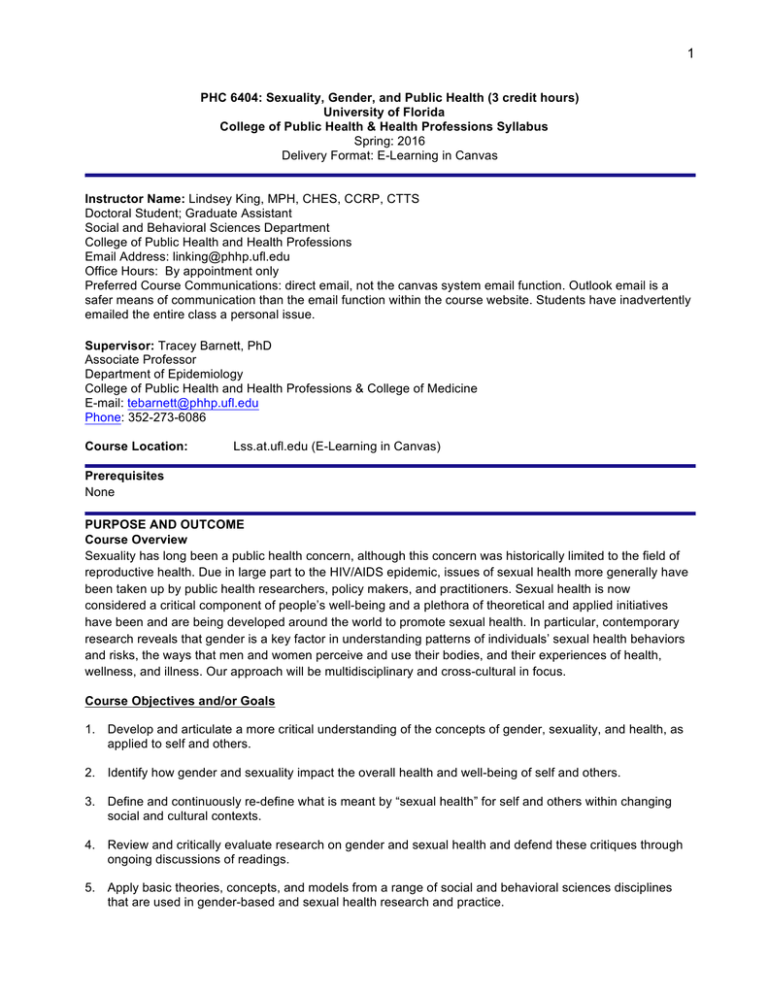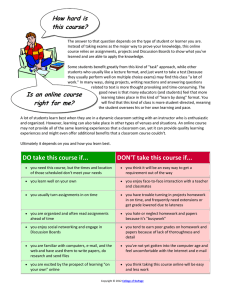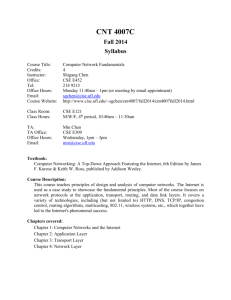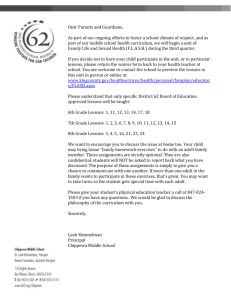
1
PHC 6404: Sexuality, Gender, and Public Health (3 credit hours)
University of Florida
College of Public Health & Health Professions Syllabus
Spring: 2016
Delivery Format: E-Learning in Canvas
Instructor Name: Lindsey King, MPH, CHES, CCRP, CTTS
Doctoral Student; Graduate Assistant
Social and Behavioral Sciences Department
College of Public Health and Health Professions
Email Address: linking@phhp.ufl.edu
Office Hours: By appointment only
Preferred Course Communications: direct email, not the canvas system email function. Outlook email is a
safer means of communication than the email function within the course website. Students have inadvertently
emailed the entire class a personal issue.
Supervisor: Tracey Barnett, PhD
Associate Professor
Department of Epidemiology
College of Public Health and Health Professions & College of Medicine
E-mail: tebarnett@phhp.ufl.edu
Phone: 352-273-6086
Course Location:
Lss.at.ufl.edu (E-Learning in Canvas)
Prerequisites
None
PURPOSE AND OUTCOME
Course Overview
Sexuality has long been a public health concern, although this concern was historically limited to the field of
reproductive health. Due in large part to the HIV/AIDS epidemic, issues of sexual health more generally have
been taken up by public health researchers, policy makers, and practitioners. Sexual health is now
considered a critical component of people’s well-being and a plethora of theoretical and applied initiatives
have been and are being developed around the world to promote sexual health. In particular, contemporary
research reveals that gender is a key factor in understanding patterns of individuals’ sexual health behaviors
and risks, the ways that men and women perceive and use their bodies, and their experiences of health,
wellness, and illness. Our approach will be multidisciplinary and cross-cultural in focus.
Course Objectives and/or Goals
1. Develop and articulate a more critical understanding of the concepts of gender, sexuality, and health, as
applied to self and others.
2. Identify how gender and sexuality impact the overall health and well-being of self and others.
3. Define and continuously re-define what is meant by “sexual health” for self and others within changing
social and cultural contexts.
4. Review and critically evaluate research on gender and sexual health and defend these critiques through
ongoing discussions of readings.
5. Apply basic theories, concepts, and models from a range of social and behavioral sciences disciplines
that are used in gender-based and sexual health research and practice.
2
Course Materials and Technology
Required Textbook:
th
Exploring the Dimensions of Human Sexuality (5 edition) by Jerrold S. Greenberg, Clint E. Bruess, and Sara
B. Oswalt (Jones and Bartlett Publishers)
Gender and Health. The Effects of Constrained Choices and Social Policies by Chloe E. Bird and Patricia P.
Rieker (Cambridge University Press)
Articles MAY be added throughout the semester as well. (Will be provided through Canvas under appropriate
weekly module)
Webcam and Microphone
Students are REQUIRED to have a microphone and webcam in place during the test-taking period.
Browser Requirements
Check regularly to be sure that your browser is compatible with e-Learning in Canvas and ProcotorU. Links
to the supported browsers and related information can be found from the Student Computing Requirements
page at http://studentlife.online.mph.ufl.edu/e-learning-support/e-learning/e-learning-in-canvas-technicalrequirements/
For technical support for this class, please contact the UF Help Desk at:
● Learning-support@ufl.edu
● (352) 392-HELP - select option 2
● https://lss.at.ufl.edu/help.shtml
What is expected of you?
You are expected to actively engage in the course throughout the semester. Your participation fosters a rich
course experience for you and your peers that facilitates overall mastery of the course objectives.
In order to be successful in an online course it is essential that students become familiar with the course
outline, syllabus, and assignments. Since we do not meet weekly, it is the sole responsibility of the student to
keep up with course requirements. To assist with this process, in the Getting Started Module, you are
assigned a syllabus/academic integrity quiz. While this quiz is ungraded, you must receive a 100% to unlock
course materials. You will NOT be able to access course materials until you complete the Getting Started
Module and pass the quiz with 100%. In addition, the course materials will be made available incrementally
throughout the semester.
3
DESCRIPTION OF COURSE CONTENT
Topical Outline/Course Schedule
Weeks/Dates
Week 1: 1/5-1/10
Lecture Topics
Course Introduction
and Overview
Assignments Due
• Syllabus quiz
• Module Assignment:
1. Introduce
yourself on
discussion post
2. Your sexuality
education
discussion post
Readings
• Reading: Greenberg
Chapter 1
(Dimensions of
Sexuality)
Week 2: 1/11-1/17
Biological &
Sociological
Approaches to Gender
& Sexuality
•
Module Assignment
•
Reading: Bird
Preface,
Introduction, and
Chapter 1
Week 3: 1/18-1/24
Biological Components
of Sexuality Part 1:
•
Module Assignment
•
Reading: Greenberg
Chapter 4 (Female
Anatomy)
•
Module Assignment
•
Reading: Greenberg
Chapter 5-6 (Male
Anatomy; Sexual
Response &
Arousal)
•
Module Assignment
•
Reading: Greenberg
Chapter 9 (Gender
Dimensions)
Reading: Bird
Chapter 2
Female Sexual
Anatomy
Week 4: 1/25-1/31
Biological Components
of Sexuality Part 2:
Male Sexual Anatomy
Sexual Response &
Arousal
Week 5: 2/1-2/7
Gender Dimensions &
Gender Explored
(Sociological)
•
Gender & Barriers to
Health: Constrained
Choice in Everyday
Decisions
(Sociological)
Week 6: 2/8-2/14
Miss Representation
Movie
•
Module Assignment:
Movie response due
•
•
Watch Miss
Representation
movie
No Readings
Week 7: 2/15-2/21
Sexual Orientation &
Gender (Biological &
Sociological)
•
Module Assignment
•
Reading: Greenberg
Chapter 10 (Sexual
Orientation)
Week 8: 2/22-2/28
EXAM 1
•
No assignments
•
No Readings
Week 9: 2/29-3/6
Spring Break – NO
Spring Break – NO
Spring Break – NO
4
Week 10: 3/7-3/13
LECTURES!
ASSIGNMENTS!
Sexuality in Adulthood
•
READINGS!
Module Assignment
•
National Social Policies
and Constrained
Choice
Week 11: 3/14-3/20
Birth Control /
Contraception
•
•
Module Assignment
•
Pregnancy
Reading: Greenberg
Chapter 12
(Sexuality in
Adulthood)
Reading: Bird
Chapter 3
Reading: Greenberg
Chapters 7
(Contraception) & 8
(Conception,
Pregnancy & Birth)
& In Focus:
Unexpected
Pregnancy
Outcomes
Week 12: 3/21-3/27
STIs & HIV
•
Module Assignment
•
Reading: Greenberg
Chapters 15 (STIs)&
In Focus: HIV and
AIDS
Week 13: 3/28-4/3
Violence & Sexuality
•
Sexual Health
report due
(No module
assignment this
week)
•
Reading: Greenberg
Chapter 3
(Communication);
Chapter 14 (Forcible
Sexual Behaviors)
•
Module Assignment
•
Reading: Bird
Chapter 4 & 5
•
Module Assignment
•
Reading: Bird
Chapters 6 & 7
•
No assignments
•
No readings
Communicating about
Sex
Week 14: 4/4-4/10
The Impact of
Community on Health
Priorities and
Expectations: Men’s
and Women’s Work,
Family Life, and Health
Week 15: 4/11-4/17
Gender and Individual
Health Choices
Opportunities for
Change
Week 16: 4/18-4/24
Exam 2
ACADEMIC REQUIREMENTS AND GRADING
Assignments
Course Components: (Note: Detailed instructions will be given for each assignment as it draws near.)
th
th
1. Syllabus/Academic Integrity Quiz: The quiz is available from January 5 – January 10 . It is the
student’s responsibility to keep up with course lectures, assignments, and readings. The quiz will
cover the course syllabus and protocols for academic integrity. Please review the syllabus, course
overview, and the academic integrity materials before completing the quiz. NOTE: While this quiz is
ungraded, you must receive a 100% to unlock course materials. You will NOT be able to access
course materials without passing the quiz.
5
2. Weekly Readings and Lectures: Each week, you will be assigned chapters and/or specified journal
articles that are related to that week’s lecture topic. Lecture videos and readings can be accessed via
the “Modules” feature in e-Learning. See the course outline for detailed information. You are
responsible for the readings in advance and will need to participate in order to be successful.
3. Post-Module Weekly Assignments (12 total): There are post-module assignments that will be
completed as homework. These assignments could include discussion posts or assignments that will
be turned in directly through the Turnitin application through Canvas. Each week’s assignment will
be due Sunday night by 11:59 PM eastern time.
o During week 6, you will be responsible for watching the documentary movie, Miss
Representation. This is available through Netflix. Please make arrangements to obtain
access to this as soon as possible. If you are unable to obtain access to this movie,
please let your instructor know as soon as possible. There will not be a separate lecture
to watch this week. Your post-module assignment will be a reaction to this movie.
Information from this movie will also appear on the exam. More information will be posted
in Canvas about the assignment.
(20 points per assignment x 12 assignments = 240 total points)
4. Exams. Two exams will be held throughout the semester. Each exam will be worth 100 points and
can contain multiple choice, true/false, matching, short answer, and essay questions. Exams will be in
week 8 (covering weeks 1-7) and week 16 (covering weeks 10-15). Exams are closed book, closed
note, and are not cumulative.
(100 points per exam x 2 exams=200 total points)
5. Sexual Health report. You may select a topic of your choosing to write a sexual health report. The
topics can range from a sexual health issue, such as a particular STI to a gender topic. This is
essentially a research paper, designed to both incorporate class materials and apply to a
particular topic. The BIGGEST thing to concentrate on is this is your opportunity to “SHOW OFF”
what you have learned in class and APPLY it to a topic of interest. This is NOT a summary of text
readings. I would anticipate about 5 pages to accomplish this, with a maximum of 7 pages. Bring in
some theory (Bird might be most helpful with this), some research background on your particular
topic, and application of course materials. This paper will be turned in through the Turnitin application
through Canvas. You MUST cite your paper in a proper citation style, double-spaced, 11-point font.
You may use any citation style you prefer but you must use a citation style. There will not be a postmodule assignment due the week the paper is due.
(100 points)
All activities (i.e. assignments, exams, and sexual health report) are due at the times listed. All
submissions will be through e-Learning. NO EXCEPTIONS.
Grading
Detailed instructions and grading criteria will be provided for the paper and discussion posts.
Requirement
Due Date
% of Final Grade (must sum to
100%)
Assignments
Throughout (all assignments due
Sundays by 11:59 PM Eastern
time)
44.0%
Exam 1
Will open at 8AM on 2/26/16 and
close at 11:59PM on 2/28/16
18.5%
Sexual health report
4/3/16
18.5%
6
Exam 2
18.5%
Will open at 8AM on 4/22/16 and
close at 11:59PM on 4/24/16
Final grade breakdown: Total = 540 Letter Grade Percentage of Course Points (out of 100%) A 93-­‐100% A-­‐ 90-­‐92% B+ 88-­‐89% B 80-­‐87% B-­‐ 78-­‐79% C+ 76-­‐77% C 70-­‐75% C-­‐ 68-­‐69% D+ 66-­‐67% D 60-­‐65% D-­‐ 58-­‐59% E <58% Points 502-­‐540 486-­‐501 475-­‐485 432-­‐474 421-­‐431 410-­‐420 378-­‐409 367-­‐377 356-­‐366 324-­‐355 313-­‐323 < 312 Please be aware that a C- is not an acceptable grade for graduate students. In addition, a grade of C counts
toward a graduate degree only if an equal number of credits in courses numbered 5000 or higher have been
earned with an A.
Letter
Grade
Grade
Points
A
A-
B+
B
B-
C+
C
C-
D+
D
D-
E
WF
I
NG
4.0
3.67
3.33
3.0
2.67
2.33
2.0
1.67
1.33
1.0
0.67
0.0
0.0
0.0
0.0
SU
0.0
For greater detail on the meaning of letter grades and university policies related to them, see the Registrar’s
Grade Policy regulations at:
http://catalog.ufl.edu/ugrad/current/regulations/info/grades.aspx
Exam Policy
ProctorU:
This course will be using ProctorU, a proctoring service for graded exams. This service is a user-friendly
system, but you must follow these guidelines to register and take your exams:
1. Students must register for a time slot for their course exams with ProctorU starting the second week of
the semester, but no later than 3 days prior to an exam. You will register for your exams at
www.proctoru.com. Their website will describe how you register and log on for your exam. Your exams
will be taken in your Canvas course, but only ProctorU will be able to open the exam for you. Please test
your computer connection and equipment via the ProctorU website prior to your exam.
2. Exams will be administered 8:00AM – 11:59PM (Eastern time), over a long weekend, Friday morning –
Sunday evening to accommodate all schedules.
3. Students will need to have a microphone and webcam in place during the test-­‐taking period. An
inexpensive webcam and microphone should work fine. Students will NOT be allowed to take an exam
without a webcam. (Note: a microphone and webcam are program requirements for the online MPH
program, see computer requirements on the program website)
4. Exams may be taken at a student’s home. Students must plan to take their exams in an environment
where other people are not in the room during the exam. The proctor will ask to see 2 forms of ID, will
ask you some questions to identify yourself, will test your microphone and camera, will ask you to pan
your desk and clear it of anything not allowed in the exam.
5. Students will need to have some administrative rights on the computer they are using for the exam to
enable the proctoring service to function. Please plan on an extra hour of time to complete the exam
7
outside the scheduled exam time to accommodate connection time with the proctor and any technical
issues that arise.
6. The program will pay your proctoring fees, but students will be responsible for late registration fees. For
exams scheduled less than 3 days before an exam, they will charge a $5 late fee.
7. It is recommended that students not use a wireless Internet connection for exams. Please consider wire
connecting your wireless laptop to your modem for a more reliable Internet signal during the exam.
Inexpensive modem cables are available in most electronic stores and online.
Policy Related to Make up Exams or Other Work
Late assignments are not accepted unless arrangements have been made ahead of the due date with the
instructor.
Please note: Any requests for make-ups due to technical issues MUST be accompanied by the ticket number
received from LSS when the problem was reported to them. The ticket number will document the time and
date of the problem. You MUST e-mail me within 24 hours of the technical difficulty if you wish to request a
make-up.
STUDENT EXPECTATIONS, ROLES, AND OPPORTUNITIES FOR INPUT
Academic Integrity
Students are expected to act in accordance with the University of Florida policy on academic integrity. As a
student at the University of Florida, you have committed yourself to uphold the Honor Code, which includes
the following pledge:
“We, the members of the University of Florida community, pledge to hold ourselves and our peers to
the highest standards of honesty and integrity.”
You are expected to exhibit behavior consistent with this commitment to the UF academic community, and on
all work submitted for credit at the University of Florida, the following pledge is either required or implied:
“On my honor, I have neither given nor received unauthorized aid in doing this assignment.”
It is your individual responsibility to know and comply with all university policies and procedures regarding
academic integrity and the Student Honor Code. Violations of the Honor Code at the University of Florida will
not be tolerated. Violations will be reported to the Dean of Students Office for consideration of disciplinary
action. For additional information regarding Academic Integrity, please see Student Conduct and Honor Code
or the Graduate Student Website for additional details:
https://www.dso.ufl.edu/sccr/process/student-conduct-honor-code/
http://gradschool.ufl.edu/students/introduction.html
Please remember cheating, lying, misrepresentation, or plagiarism in any form is unacceptable and
inexcusable behavior.
Turnitin
Academic integrity is a serious issue that has been a growing problem at Universities. I have a zero tolerance
policy for breaches of academic integrity, including plagiarism and cheating. There are multiple video
resources posted on our Canvas site that discuss plagiarism and how to properly quote and cite other
people’s work. With each assignment and exam you complete you are pledging that you hold yourself and
your classmates to the highest standards of academic integrity.
I use an online tool called Turnitin to check student work for originality; in other words, your work should be in
your own words and not copied from any source. Every student needs to watch the videos on plagiarism and
on using Turnitin and needs to check their own Turnitin report, made available through the Canvas site
automatically when you submit anything though assignments. You should submit assignments early enough
to have time before the due date to make revisions to them if your Turnitin report shows areas of high
similarity to online resources. Any student caught cheating or plagiarizing will be reported to the Dean of
Students Office and will be subject to academic penalties in the course, at minimum.
8
Online Faculty Course Evaluation Process
Students are expected to provide feedback on the quality of instruction in this course by
completing online evaluations at https://evaluations.ufl.edu. Evaluations are typically open
during the last two or three weeks of the semester, but students will be given specific times
when they are open. Summary results of these assessments are available to students at
https://evaluations.ufl.edu/results/.
SUPPORT SERVICES
Accommodations for Students with Disabilities
If you require classroom accommodation because of a disability, you must register with the Dean of Students
Office http://www.dso.ufl.edu within the first week of class. The Dean of Students Office will provide
documentation of accommodations to you, which you then give to me as the instructor of the course to
receive accommodations. Please make sure you provide this letter to me by the end of the second week of
the course. The College is committed to providing reasonable accommodations to assist students in their
coursework.
Counseling and Student Health
Students sometimes experience stress from academic expectations and/orpersonaland interpersonal issues
that may interfere with their academic performance. If you find yourself facing issues that have the potential to
or are already negatively affecting your coursework, you are encouraged to talk with an instructor and/or seek
help through University resources available to you.
• The Counseling and Wellness Center 352-392-1575 offers a variety of support services such as
psychological assessment and intervention and assistance for math and test anxiety. Visit their web
site for more information: http://www.counseling.ufl.edu.On line and in person assistance is available.
• You Matter We Care website: http://www.umatter.ufl.edu/. If you are feeling overwhelmed or stressed,
you can reach out for help through the You Matter We Care website, which is staffed by Dean of
Students and Counseling Center personnel.
• The Student Health Care Center at Shands is a satellite clinic of the main Student Health Care Center
located on Fletcher Drive on campus. Student Health at Shands offers a variety of clinical services.
The clinic is located on the second floor of the Dental Tower in the Health Science Center. For more
information, contact the clinic at 392-0627 or check out the web site at: https://shcc.ufl.edu/
• Crisis intervention is always available 24/7 from:
Alachua County Crisis Center
(352) 264-6789
http://www.alachuacounty.us/DEPTS/CSS/CRISISCENTER/Pages/CrisisCenter.aspx
Do not wait until you reach a crisis to come in and talk with us. We have helped many students through
stressful situations impacting their academic performance. You are not alone so do not be afraid to ask for
assistance.




